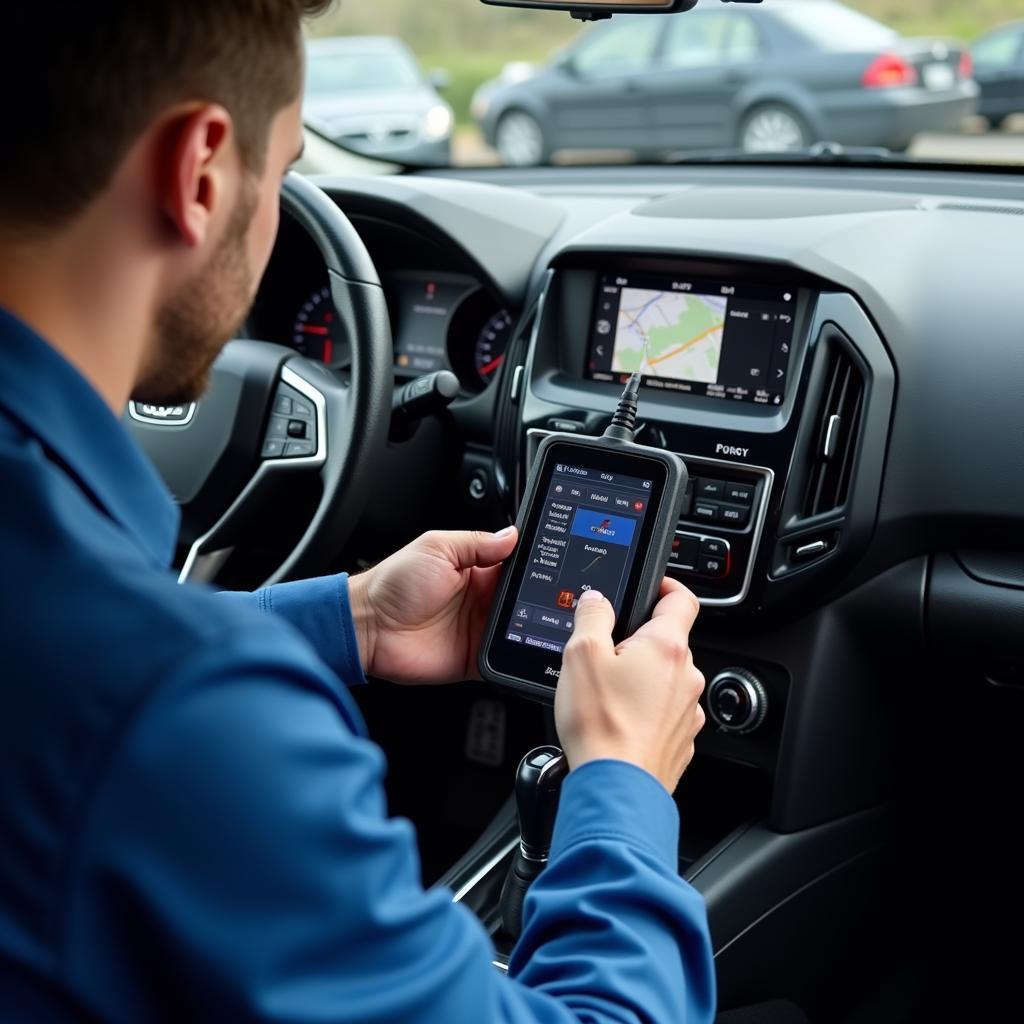Interested in a career where you’re the detective of the automotive world? The rise of sophisticated technology in vehicles means skilled car diagnostic technicians are in high demand. But do you need a Car Diagnostic Degree to be successful in this field? Let’s explore this question and see if it’s the right path for you.
Understanding the Car Diagnostic Landscape
Gone are the days of simple car repairs. Today’s vehicles are complex machines with intricate electronic systems. This is where car diagnostic technicians come in. These skilled professionals use advanced equipment and their knowledge to identify issues, troubleshoot problems, and keep cars running smoothly.
 Car diagnostic technician using a scan tool on a vehicle
Car diagnostic technician using a scan tool on a vehicle
Is a Car Diagnostic Degree Necessary?
While a formal degree in car diagnostics isn’t always mandatory, it can offer a significant advantage in this competitive field. Here’s why:
1. Comprehensive Knowledge Base: A dedicated degree program provides a structured curriculum covering all aspects of car diagnostics. You’ll delve into engine mechanics, electrical systems, computer diagnostics, and more, building a strong foundation for your career.
2. Hands-On Experience: Reputable car diagnostic programs prioritize practical training. You’ll spend considerable time in workshops, working on real vehicles, and mastering diagnostic tools and techniques under the guidance of experienced instructors.
 Students practicing car diagnostics in a workshop
Students practicing car diagnostics in a workshop
3. Industry Recognized Credentials: Graduating with a car diagnostic degree demonstrates your commitment to the profession and can give you a competitive edge in the job market. Employers often prefer candidates with formal qualifications.
Exploring Car Diagnostic Education Options
If you’re ready to jumpstart your career in car diagnostics, there are various educational pathways to consider:
-
Associate’s Degree: An Associate of Applied Science (AAS) in Automotive Technology with a specialization in diagnostics is a popular choice. These two-year programs balance theory and practical application.
-
Certificate Programs: For those seeking a quicker entry point, certificate programs offer focused training on specific diagnostic areas. These can be completed in a shorter timeframe, typically within a year.
-
Specialized Training Courses: Manufacturers and industry organizations offer specialized training on specific vehicle makes and models or advanced diagnostic techniques. These courses provide in-depth knowledge and can enhance your skillset.
Career Paths with a Car Diagnostic Degree
A car diagnostic degree opens doors to a rewarding career with diverse opportunities:
-
Automotive Technician: Diagnose and repair a wide range of vehicle issues using your comprehensive knowledge of mechanical and electronic systems.
-
Service Advisor: Act as a liaison between customers and technicians, utilizing your diagnostic skills to understand and explain vehicle problems effectively.
-
Shop Foreman: Supervise and manage a team of technicians, ensuring quality repairs and efficient workflow.
-
Mobile Diagnostic Technician: Provide on-site diagnostic services to customers, offering convenience and flexibility.
Is a Car Diagnostic Degree Right for You?
If you enjoy problem-solving, working with your hands, and have a passion for cars, a career in car diagnostics might be a perfect fit. A degree in this field equips you with the knowledge, skills, and credibility to succeed in this in-demand profession.
Remember, investing in your education is an investment in your future. Research different programs, explore your options, and choose the path that aligns best with your career goals.

Leave a Reply